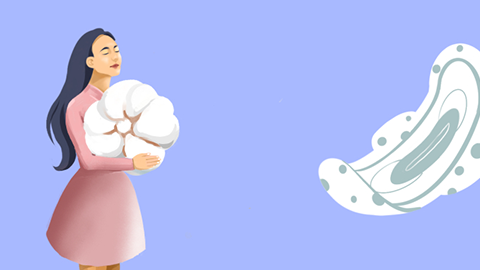What could be the reason for menstruation occurring one month and not the next?
"Big Aunt" is a colloquial term for menstruation. When menstrual periods occur one month and are absent the next, it may be caused by emotional fluctuations, excessive dieting, thin endometrium, polycystic ovary syndrome (PCOS), hypothyroidism, or other factors. This can be improved through emotional regulation, dietary adjustments, and medication. If symptoms persist or are accompanied by abnormal menstrual flow or abdominal pain, prompt medical attention is necessary.
1. Emotional fluctuations: Prolonged anxiety, depression, and other negative emotions can disrupt the endocrine system, leading to hormonal imbalances and irregular menstruation. It is recommended to relieve stress through exercise, listening to music, communicating with family, and maintaining a calm state of mind.
2. Excessive dieting: Overly restricting food intake for weight loss can lead to nutritional deficiencies, impair ovarian function, and cause menstrual disorders. It is advised to resume normal eating habits, ensure adequate intake of protein and vitamins, and avoid blind dieting.

3. Thin endometrium: Repeated abortions or insufficient estrogen levels can result in poor endometrial growth, affecting the menstrual cycle and often causing reduced menstrual flow. Follow medical advice to use medications such as estradiol valerate tablets, conjugated estrogens tablets, and progesterone capsules to improve symptoms.
4. Polycystic ovary syndrome (PCOS): Hormonal imbalance leads to elevated androgen levels and abnormal ovulation, resulting in infrequent menstruation, often accompanied by hirsutism and acne. Under medical guidance, medications such as ethinylestradiol/cyproterone acetate tablets, drospirenone-ethinyl estradiol tablets, and spironolactone tablets may be used to manage symptoms.
5. Hypothyroidism: Insufficient thyroid hormone secretion affects metabolism and the endocrine system, leading to prolonged menstrual cycles, along with fatigue and cold intolerance. Under medical supervision, medications such as levothyroxine sodium tablets, thyroid extract tablets, and Jin Kui Shen Qi Wan may be prescribed to improve symptoms.
Maintain a regular sleep schedule and avoid staying up late. Engage in moderate physical activities such as walking or yoga. Eat a balanced diet rich in soy products, stay warm, and avoid exposure to cold to help stabilize the menstrual cycle.




